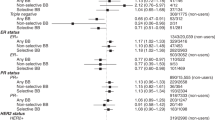Abstract
Beta-blockers (BB) drugs have been used for decades worldwide, mainly to treat hypertension. However, in recent epidemiological studies, BBs were suggested to improve cancer prognosis. In the wake of this evidence, we evaluated the possible therapeutic effect of BBs in triple-negative breast cancer (TNBC) patients. We identified 800 postmenopausal women operated between 1997 and 2008 for early primary TNBC. The effect of BB intake on the risk of breast cancer (BC) recurrence and death was evaluated through competing risk and Cox regression survival models. At cancer diagnosis, 74 (9.3 %) women out of 800 were BBs users. Median age was 62 years in BB users and 59 years in non-users (P = 0.02). BB users and non-users were similarly distributed by all tumor characteristics. The 5-year cumulative incidence of BC-related events was 13.6 % in BB users and 27.9 % in non-users (P = 0.02). The beneficial impact of BBs remained statistically significant at multivariable analysis (HR, 0.52; 95 % CI 0.28–0.97), after the adjustment for age, tumor stage, and treatment, peritumoral vascular invasion and use of other antihypertensive drugs, antithrombotics, and statins. Adjusted HRs for metastases and for BC deaths were 0.32 (95 % CI 0.12–0.90) and 0.42 (95 % CI 0.18–0.97), respectively, in favor of BBs. Hypertension, other antihypertensive drugs, antithrombotics, and statins did not impact prognosis. In this series of postmenopausal TNBC patients, BB intake was associated with a significantly decreased risk of BC-related recurrence, metastasis, and BC death. Innovative therapeutic strategies including BBs should be urgently explored in cancer patients.



Similar content being viewed by others
References
Ram CV (2010) Beta-blockers in hypertension. Am J Cardiol 106(12):1819–1825
Grytli HH, Fagerland MW, Fosså SD et al (2013) Association between use of β-blockers and prostate cancer-specific survival: a cohort study of 3561 prostate cancer patients with high-risk or metastatic disease. Eur Urol 64(1):e11–e12
Grytli HH, Fagerland MW, Fosså SD et al (2013) Use of β-blockers is associated with prostate cancer-specific survival in prostate cancer patients on androgen deprivation therapy. Prostate 73(3):250–260
Melhem-Bertrandt A, Chavez-Macgregor M, Lei X et al (2011) Beta-blocker use is associated with improved relapse-free survival in patients with triple-negative breast cancer. J Clin Oncol 29(19):2645–2652
Barron TI, Connolly RM, Sharp L et al (2011) Beta blockers and breast cancer mortality: a population-based study. J Clin Oncol 29(19):2635–2644
Powe DG, Voss MJ, Zänker KS et al (2010) Beta-blocker drug therapy reduces secondary cancer formation in breast cancer and improves cancer specific survival. Oncotarget 1(7):628–638
Ganz PA, Habel LA, Weltzien EK et al (2011) Examining the influence of beta blockers and ACE inhibitors on the risk for breast cancer recurrence: results from the LACE cohort. Breast Cancer Res Treat 129(2):549–556
Wang HM, Liao ZX, Komaki R et al (2013) Improved survival outcomes with the incidental use of beta-blockers among patients with non-small-cell lung cancer treated with definitive radiation therapy. Ann Oncol 24(5):1312–1319
Diaz ES, Karlan BY, Li AJ (2012) Impact of beta blockers on epithelial ovarian cancer survival. Gynecol Oncol 127(2):375–378
De Giorgi V, Grazzini M, Gandini S et al (2011) Treatment with β-blockers and reduced disease progression in patients with thick melanoma. Arch Intern Med 171(8):779–781
Lemeshow S, Sørensen HT, Phillips G et al (2011) β-Blockers and survival among Danish patients with malignant melanoma: a population-based cohort study. Cancer Epidemiol Biomarkers Prev 20(10):2273–2279
Monami M, Filippi L, Ungar A et al (2013) Further data on beta-blockers and cancer risk: observational study and meta-analysis of randomized clinical trials. Curr Med Res Opin 29(4):369–378
Perron L, Bairati I, Harel F et al (2004) Antihypertensive drug use and the risk of prostate cancer (Canada). Cancer Causes Control 15(6):535–541
Powe DG, Entschladen F (2011) Targeted therapies: using β-blockers to inhibit breast cancer progression. Nat Rev Clin Oncol 8(9):511–512
Antoni MH, Lutgendorf SK, Cole SW et al (2006) The influence of bio-behavioural factors on tumour biology: pathways and mechanisms. Nat Rev Cancer 6(3):240–248
Cole SW, Sood AK (2012) Molecular pathways: beta-adrenergic signaling in cancer. Clin Cancer Res 18(5):1201–1206
Schuller HM (2010) Beta-adrenergic signaling, a novel target for cancer therapy? Oncotarget 1(7):466–469
Campbell JP, Karolak MR, Ma Y et al (2012) Stimulation of host bone marrow stromal cells by sympathetic nerves promotes breast cancer bone metastasis in mice. PLoS Biol 10(7):e1001363
Benish M, Bartal I, Goldfarb Y et al (2008) Perioperative use of beta-blockers and COX-2 inhibitors may improve immune competence and reduce the risk of tumor metastasis. Ann Surg Oncol 15(7):2042–2052
Drell TL 4th, Joseph J, Lang K et al (2003) Effects of neurotransmitters on the chemokinesis and chemotaxis of MDA-MB-468 human breast carcinoma cells. Breast Cancer Res Treat 80(1):63–70
Sloan EK, Priceman SJ, Cox BF et al (2010) The sympathetic nervous system induces a metastatic switch in primary breast cancer. Cancer Res 70(18):7042–7052
Daly CJ, McGrath JC (2011) Previously unsuspected widespread cellular and tissue distribution of β-adrenoceptors and its relevance to drug action. Trends Pharmacol Sci 32:219–226
Jansen L, Below J, Chang-Claude J et al (2012) Beta blocker use and colorectal cancer risk: population-based case–control study. Cancer 118(16):3911–3919
Sørensen GV, Ganz PA, Cole SW et al (2013) Use of β-blockers, angiotensin-converting enzyme inhibitors, angiotensin II receptor blockers, and risk of breast cancer recurrence: a Danish nationwide prospective cohort study. J Clin Oncol 31(18):2265–2272
Conflict of interest
None.
Author information
Authors and Affiliations
Corresponding author
Electronic supplementary material
Below is the link to the electronic supplementary material.
Rights and permissions
About this article
Cite this article
Botteri, E., Munzone, E., Rotmensz, N. et al. Therapeutic effect of β-blockers in triple-negative breast cancer postmenopausal women. Breast Cancer Res Treat 140, 567–575 (2013). https://doi.org/10.1007/s10549-013-2654-3
Received:
Accepted:
Published:
Issue Date:
DOI: https://doi.org/10.1007/s10549-013-2654-3




